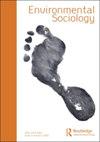Should we adapt nature to climate change? Weighing the risks of selective breeding in Pacific salmon
IF 2.8
Q3 ENVIRONMENTAL STUDIES
引用次数: 1
Abstract
ABSTRACT This paper uses the case of genomics-assisted selective breeding in Pacific salmon hatcheries to investigate how people weigh the risks of adapting nature to changing climate conditions. Drawing on 105 interviews with people involved in salmon management, this study embeds risk assessments of selective breeding in the context of present interventions into salmon life cycles. While responses to novel technologies are frequently plotted along a support-opposition continuum, the debate over selective breeding Pacific salmon is multivalent, with respondents supporting selective breeding in some contexts while opposing it in others. Nearly half of respondents supported selective breeding to fix the mistakes of past interventions and rewild salmon. Given that past problems have stemmed from technological responses, these findings paradoxically suggest that further interventions may not necessarily be perceived as violating values of naturalness or wildness. Genomic technologies offer new pathways for climate adaptation. In doing so, they expand ethical debates about the role of humans and novel technologies in conserving and managing wildlife.我们应该让自然适应气候变化吗?权衡太平洋鲑鱼选择性繁殖的风险
摘要本文以太平洋鲑鱼孵化场的基因组学辅助选择性繁殖为例,研究人们如何权衡使自然适应不断变化的气候条件的风险。本研究通过对105名参与鲑鱼管理的人员的采访,将当前干预措施背景下的选择性繁殖风险评估纳入鲑鱼生命周期。虽然对新技术的反应经常沿着支持-反对的连续体绘制,但关于选择性养殖太平洋鲑鱼的辩论是多价的,受访者在某些情况下支持选择性养殖,而在另一些情况下则反对。近一半的受访者支持选择性养殖,以纠正过去干预措施的错误,并重新养殖三文鱼。鉴于过去的问题源于技术反应,这些发现矛盾地表明,进一步的干预可能不一定被视为违反自然或野性的价值观。基因组技术为气候适应提供了新途径。通过这样做,他们扩大了关于人类和新技术在保护和管理野生动物方面的作用的伦理辩论。
本文章由计算机程序翻译,如有差异,请以英文原文为准。
求助全文
约1分钟内获得全文
求助全文
来源期刊

Environmental Sociology
ENVIRONMENTAL STUDIES-
CiteScore
4.60
自引率
12.00%
发文量
34
期刊介绍:
Environmental Sociology is dedicated to applying and advancing the sociological imagination in relation to a wide variety of environmental challenges, controversies and issues, at every level from the global to local, from ‘world culture’ to diverse local perspectives. As an international, peer-reviewed scholarly journal, Environmental Sociology aims to stretch the conceptual and theoretical boundaries of both environmental and mainstream sociology, to highlight the relevance of sociological research for environmental policy and management, to disseminate the results of sociological research, and to engage in productive dialogue and debate with other disciplines in the social, natural and ecological sciences. Contributions may utilize a variety of theoretical orientations including, but not restricted to: critical theory, cultural sociology, ecofeminism, ecological modernization, environmental justice, organizational sociology, political ecology, political economy, post-colonial studies, risk theory, social psychology, science and technology studies, globalization, world-systems analysis, and so on. Cross- and transdisciplinary contributions are welcome where they demonstrate a novel attempt to understand social-ecological relationships in a manner that engages with the core concerns of sociology in social relationships, institutions, practices and processes. All methodological approaches in the environmental social sciences – qualitative, quantitative, integrative, spatial, policy analysis, etc. – are welcomed. Environmental Sociology welcomes high-quality submissions from scholars around the world.
 求助内容:
求助内容: 应助结果提醒方式:
应助结果提醒方式:


